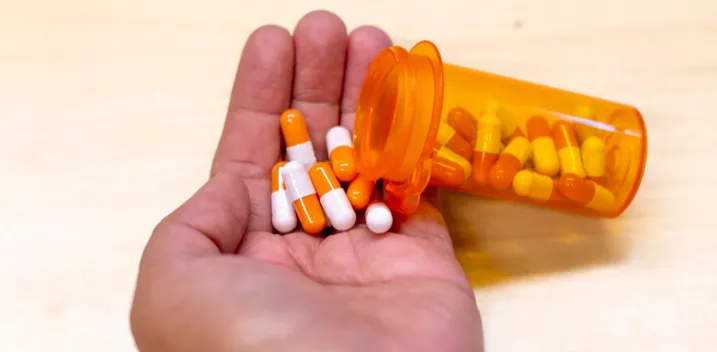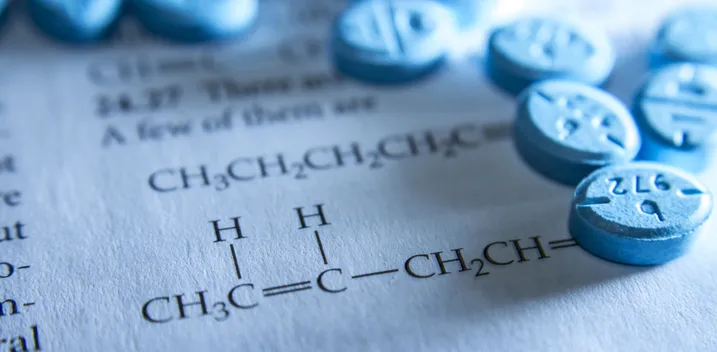What is Adderall?
Adderall is a prescription stimulant that treats attention-deficit/hyperactivity disorder or ADHD. According to the National Institute of Mental Health, ADHD is a disorder that makes it difficult for an individual to maintain focus or control impulsive behaviors. Adderall is an effective drug that increases focus and attention, but its misuse can having even patients asking, “Am I addicted to Adderall?”
What Does Adderall Treat?
These are two of the most prominent factors that those with ADHD need addressing. Adderall can help those with ADHD by reducing hyperactive behavior when taken as prescribed. In addition, it decreases impulsivity and sharpens focus. Sometimes, Adderall is prescribed because it increases wakefulness in individuals with narcolepsy.
However, Adderall is a prescription stimulant that can become habit-forming when abused. Especially in young people and teens, it can also begin to set up a pattern of abuse later in life, a phenomenon currently being better studied at the national level.
Who Abuses Adderall?
Adderall abuse occurs by people of all ages, but most specifically among college students. The reason behind Adderall abuse across this demographic is the jolt of energy it produces. College students find it appealing, as taking it can help them stay awake to study, write papers, etc.
Adderall and the Student Body
According to the National Institute on Drug Abuse, studies show overall Adderall misuse is higher among college students (11.1%) than their non-college peers (8.1%). This same group of individuals also abuse it while partying. Adderall abuse is a way to keep students awake and counter the depressant effects of alcohol.
Moms and Stimulant Abuse
In addition to college students, there are more mothers abusing Adderall than ever before. Managing a household, especially one with children, can be absolutely exhausting for a mother. Being a mother involves getting up in the middle of the night with upset or sick children, staying up with them to finish homework, bringing them to different extracurricular activities, and so on.
Another potentially appealing aspect of Adderall for moms can be its weight-loss potential, and reduction in appetite that goes along with Adderall abuse can be helpful when you’re on the go.
The amount of energy that a mother has to bring to the table can be overwhelming for some. Rather than scaling back, it can seem easier and more appealing to take Adderall to help keep up the pace.
College students and mothers are not the only groups of individuals who abuse Adderall, as it is a drug that is attractive to anyone who wants to achieve an energetic high. Despite it being a prescription drug that is frequently prescribed to teenagers and young adults, Adderall remains a dangerous substance that can destroy one’s health and wellbeing.
Signs of Adderall Addiction: Am I Addicted to Adderall?
You may be wondering if you are addicted to Adderall if you are not taking it as prescribed. Determining if you have an addiction to this prescription drug can be extremely difficult, especially because there always exists a sense of “it can’t happen to me” in everyone.
Generally speaking, it can help to know the stages of addiction and realize that dependence on a substance is generally something that occurs over time. While psychological dependence can occur quickly, the physical and more profound effects of Adderall abuse take longer to accumulate and can be harder to detect.
As a rough guideline, if you begin to experience withdrawal symptoms, then you likely have a substance use disorder, although its severity will vary with history of use, dosage taken, and even method of administration.
Method of Administration and Adderall Withdrawal
Other telltale indicators of Adderall misuse come from the way in which a person takes the drug. While many who develop an utter dependency on the stimulant began by taking it as prescribed, for those who become addicted their use crosses the line, with more pills taken, more frequently.
Another warning sign can be the decision to begin snorting your prescription. While more common with college students, beginning to research ‘How to snort Adderall,’ or actually crushing and sniffing your prescription (the technical term being insufflation) is definitely a red flag in terms of Adderall use.
Adderall and Alcohol: Polysubstance Abuse
While it can be normal to have an Adderall prescription and drink a beer or have a glass of wine, the deliberate attempt to enhance the effects of Adderall by combining it with drinking or other drug use can point to problematic use of the prescription stimulant.
Alcohol and Adderall can be the most common mix, but other ‘cocktails’ reported as being abused by students include Adderall and marijuana, as well as the Adderall and benzodiazepines such as Xanax or Klonopin. For users who have taken more than their recommended dose of the stimulant, these mixes are often an attempt to reign in overwhelming effects, another warning sign in itself.
However, being aware of what constitutes an addiction itself is imperative. If you are in fact addicted to Adderall (or any other substance), it is critical that you get the right treatment.
Symptoms of Adderall Use Disorders
If you are addicted to stimulants or any other substance, there are some symptoms commonly associated with a substance use disorder, as well as the disease concept of addiction. These symptoms are applicable to Adderall addiction and include:
- Using outside of recommended guidelines
- Increasing the amount you are using in order to achieve a high (this is known as tolerance)
- Experiencing withdrawal symptoms when unable to use as much as normal or stop using altogether
- Feeling like you cannot function without the drug(s)
- Your use is impacting your performance at work or school or interfering with your home life
- Continuing to use despite the consequences it has caused you and/or others
- Attempting to get multiple prescriptions of your drug of choice by visiting different doctors (known as doctor shopping)
- Changing the format of the substance (e.g. crushing a prescription drug to snort it instead of swallow it)
- Withdrawing socially and no longer participating in previously enjoyed activities
- Being unable to control the amount of drugs/alcohol you consume
Symptoms of Adderall Addiction
When specifically addicted to Adderall, symptoms of this type of addiction include the following:
- Anxiety
- Racing thoughts
- Panic
- Nervousness
- Loss of appetite
- Exhaustion
- Impulsivity
- Manic behavior
Someone who uses Adderall appropriately is not going to experience these symptoms. Therefore, you may be addicted to Adderall if some or all of these symptoms are present in your life. It is important to note that you do not need to engage in long-term use of Adderall to start seeing these symptoms or to become addicted to it.
Adderall as a Gateway Drug
Although the concept of gateway drugs has largely been dismissed in the medical community, another reason to explore answers about Adderall misuse and addiction can be the stories shared by others who have gone onto stronger stimulants, such as methamphetamine, and polysubstance addiction after having begun with prescription amphetamine salts (the chemicals that compose Adderall).
The correlation between Adderall and later meth usage may be anecdotal, but if the drug becomes ineffective for a regular, heavy prescribed user, then perhaps the need to search for a more potent, illegal, and highly dangerous, alternative, becomes an attractive option.
As a public safety crisis envelopes America, it is worth noting that the purchase of any sort of prescription drug from the ‘street’ carries a risk of fentanyl contamination, and anyone using Adderall or other prescriptions bought illegally should be aware of the risks. Furthermore, the rapidly increasing amount of meth overdoses in the United States brings to bear an important note: stimulant abuse is also associated with overdose, perhaps less than opioids, but very much a concern for regular users.
Can You Overdose on Adderall?
The short answer is yes, absolutely. Although overdose on Adderall may not garner the headlines and public outrage as the opioid crisis ravaging our country, the rising abuse of meth overdoses points to the real risk with stimulant abuse. And as the purity has risen (and the price has fallen) for methamphetamine throughout America, it has also been increasingly reported as a contaminant in counterfeit prescription pills, including Adderall and Dexedrine.
If you find yourself purchasing Adderall from black market sources of any kind, the danger of contamination and potential overdose is a legitimate one. For anyone who has turned to these measures, there is a solid chance your Adderall use disorder is in the stage of full-blown addiction.
Levels of Care in Stimulant Treatment
From our inpatient treatment center, with a medically supervised detox, to our Partial Hospitalization Program and Intensive Outpatient Program, the luxury addiction treatment at Circle of Hope meets clients where they are, in every sense of the word. If you are a professional whose level of Adderall misuse needs substance abuse counseling on an outpatient basis, privately and confidentially (as with all our services) we can accommodate you. If things have risen to the level of addiction, and you feel you might benefit from the structure and accountability (all in a luxury setting) of residential treatment, Circle of Hope offers that to all of our inpatient clients.
No matter your circumstance, if you are asking yourself about your Adderall use and its health, you owe it to yourself to check in with our Admissions team and find out more about our offerings. Even if our program isn’t the best fit, we will let you know about the resources available near you and can offer a free assessment and insurance verification.
Every person who struggles with the disease of addiction does so in his or her own way, meaning that one person might become hooked within a few weeks of misuse while another person doesn’t become addicted for a few months. If you are suffering from Adderall addiction, it is crucial to reach out for help as soon as possible.
Getting Help for Adderall Addiction
If you know you have an addiction to Adderall, or even if you think you might, it is critical that you do not keep up this deadly cycle of abuse. Addiction is a progressive disease, meaning that the longer you keep using, the more severe the consequences can be. The idea of asking for help might be overwhelming and intimidating, especially if you do not know what to do.
Consider the following if you believe you need help for Adderall addiction:
- Contact your primary care provider and ask for referrals to the appropriate people/facilities that can offer residential addiction treatment
- Tell a friend, family member, or loved one about your concerns, as they can offer support and assistance in finding the right care
- Go to 12-Step meetings (such as Narcotics Anonymous, or NA) to get immediate community support
- If you have a therapist, even a family therapist, contact him or her and discuss your feelings
Simply telling someone else, whether it be a medical professional like a doctor or someone close to you like a parent or sibling, can get the ball rolling in the right direction in terms of getting the care that you need.
If you need help, do not wait one more day. Reach out to us right now to learn more about how you can stop abusing Adderall and start living in recovery with the aid of the experts at Circle of Hope.



